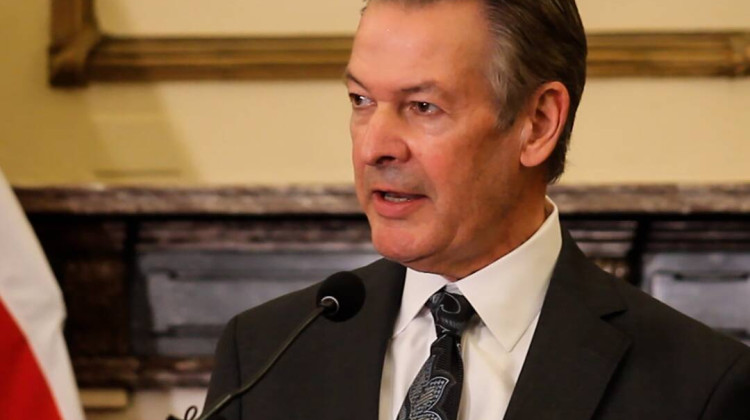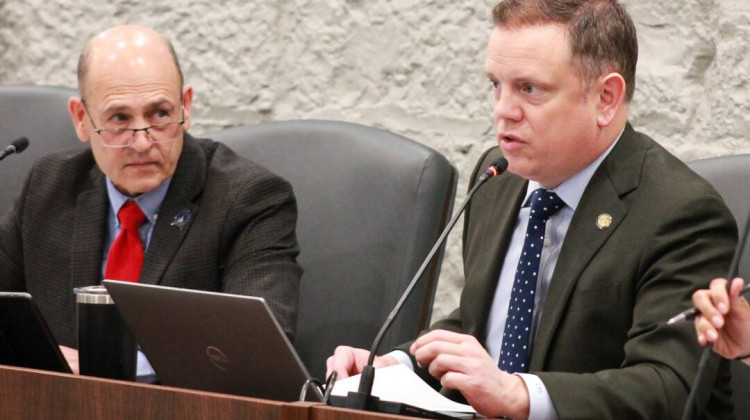
The state of Indiana and the ACLU of Indiana faced off in Marion County court on Oct. 14, 2022 over a lawsuit that challenges the state's near-total abortion ban on religious freedom grounds.
Brandon Smith / IPB NewsA county judge could rule by the end of November whether Indiana’s near-total abortion ban violates the state’s religious freedom law.
Under Indiana's Religious Freedom Restoration Act (RFRA), the state can’t substantially burden someone’s religious practice unless it’s advancing a compelling government interest in the least restrictive way.
When it comes to the abortion ban, the ACLU and state attorneys fundamentally disagree over every facet of that test.
First, to the question of whether the ban substantially burdens anyone, ACLU of Indiana Legal Director Ken Falk represents a group of Hoosier women who said they’ve already changed their behavior because of the law.
“People who are behaving responsibly will not become pregnant or not risk pregnancy if they can’t be assured that, in case there is something that injures their health, that they will be able to resolve the pregnancy,” Falk said.
But in a court hearing Friday, Indiana Solicitor General Thomas Fisher called those changes in behavior "mere inconveniences."
Fisher also argued that abortion isn't a religious practice that requires protecting. For example, the Muslim faith prohibits self harm. Fisher said access to abortion is a means to that end – and not a religious practice by itself.
Falk countered that many practices protected by RFRA – such as gathering to worship – are means to a religious practice.
"The state cannot simply decree what is secular and what is religious," Falk said.
To the question of whether the abortion ban advances a compelling interest, Fisher said the state wants to prevent "life" from termination.
"It's a widely accepted ethical assessment of the value of human life and the need to protect human life at all stages," Fisher said.
But Falk said that the very issue of whether a fetus is a life is a religious debate and that the government should remain neutral, not take a side.
And to the question of whether the ban advances a government interest in the least restrictive way possible, Falk pointed to exceptions to the ban already in law: when the life or serious health of the pregnant person is at risk, in some cases of lethal fetal anomalies and in some cases of rape of incest.
Falk said the state can't make those exceptions but then argue exceptions for religious beliefs aren't possible.
Yet Fisher said the ban is the only way to "protect the unborn."
"There are no ways to achieve the state’s objectives with broad exceptions," Fisher said.
Despite all those arguments, there's a question of whether the judge will even get to the religious freedom debate at this stage of the lawsuit.
Join the conversation and sign up for the Indiana Two-Way. Text "Indiana" to 73224. Your comments and questions in response to our weekly text help us find the answers you need on statewide issues.
Friday's hearing was for a preliminary injunction – a hold on the law that would temporarily prevent it from being enforced. Fisher pointed out that the abortion ban is already halted because of a different lawsuit.
“If the other injunction isn’t enough for [the plaintiffs], why would this one be any different?” Fisher said.
The abortion ban is on hold through at least mid-January, as an appeal in the other lawsuit continues.
Contact reporter Brandon at bsmith@ipbs.org or follow him on Twitter at @brandonjsmith5.
9(MDAyMzk1MzA4MDE2MjY3OTY1MjM5ZDJjYQ000))
 DONATE
DONATE






 Support WFYI. We can't do it without you.
Support WFYI. We can't do it without you.